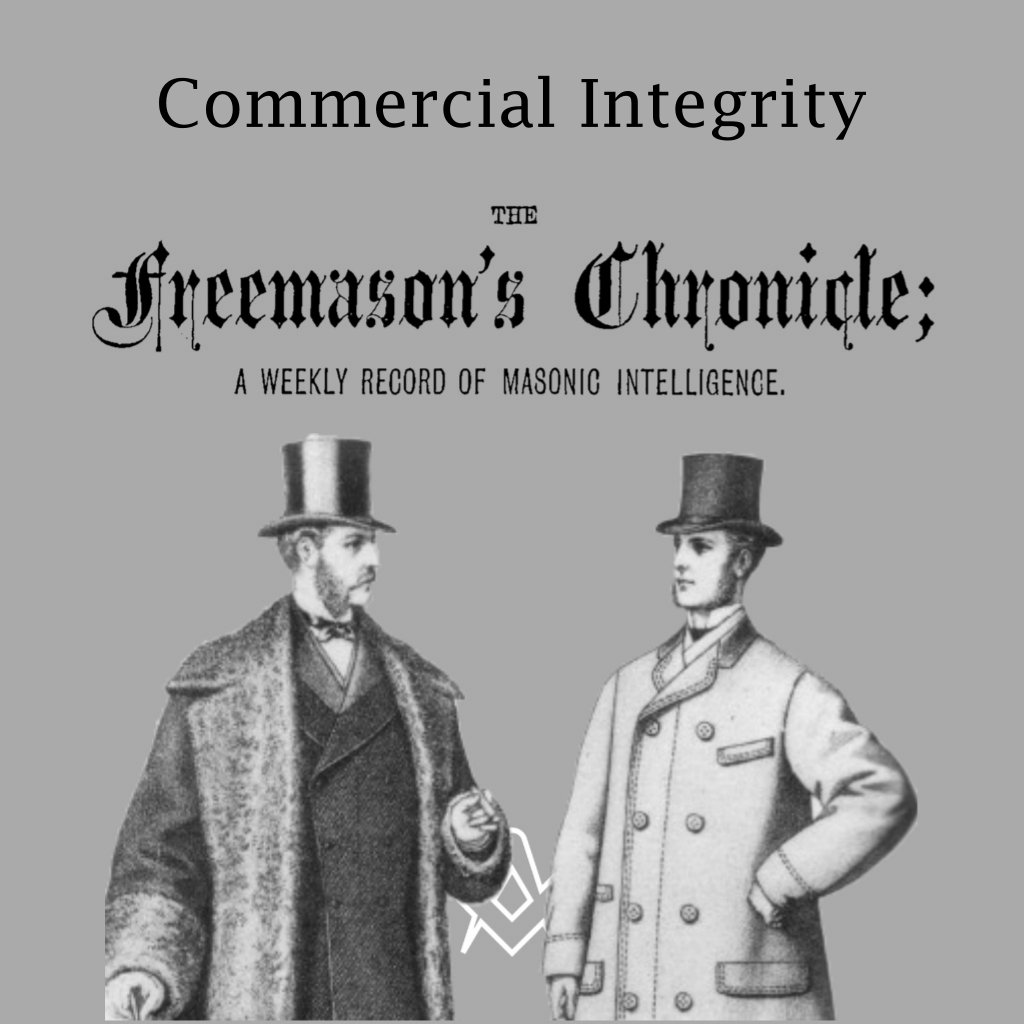The moralist who cares to lecture society upon its shortcomings may find much scope for scathing invective in the revelations of the inner life of commercial society with which the newspapers of the day are teeming.
Implementing Freemasonry’s peculiar system of morality in our day to day business affairs was the topic of this article, Commercial Integrity, first published in The Freemason’s Chronicle – 8 May 1875
He might tell us, if homilies were not out of fashion, that middle class people are rapidly falling away from the old standard of integrity which was reverenced by our grandfathers, and he might rail to his heart’s content against the eager seeking for wealth which is the characteristic of the age, against the frivolity of society generally, and against the manifest disregard for good faith and truth which prevails so largely amongst commercial men.
Perhaps he would not be listened to if he were to preach from so trite a text as that which heads this article.
Or if he were to compel attention, by eccentricity of manner, or the mere force of unadorned eloquence, ho might fairly surmise that his moralising would be forgotten or ignored by the time the sun rose upon the next business day.
An impatience of mere lecturing, as well as a contempt for the so-called humdrum ethics of the past, is a common failing of the men of the day, who affect to think that success justifies any policy, and will condone any breach of the moral code.
We do not intend to set ourselves up as the correctors of the errors of our time, nor are we willing to assume the part of a priggish censor of failings which have grown with the nation’s growth, and which, if not corrected, may sap, at no distant day, those broad principles upon which society stands.
Yet while disclaiming the role of the moralist, we would venture to direct attention to the fact that integrity, in its worldly sense, is the key-stone of the structure of a nation’s commercial greatness, and we may hint that there are signs abroad which would appear to show that the time is approaching when no man’s word will be taken as his bond.
Let us say what we will, or disguise the facts to which we allude as we may, it is patent to every observer of the signs of the times that a respect for truth, for its own sake, is not among the crowning virtues of some of the business men of this or any other city in the kingdom.
Men are compelled to give in their adhesion to scientific truths, and no more think of questioning the facts which the chemist or the astronomer brings to light than they would think of questioning the validity of the laws of gravitation.
But, moral truth, in all its wide ramifications, appears to be losing its hold upon the minds of all classes.
If men do not actually lie, in the vulgar acceptation of the word, they do not scruple, in business matters at least, to indulge in interested exaggerations which they know do not fairly characterise the transactions in which they are engaged.
And if a qualm of conscience ever comes over them they are ready enough to console themselves with the plausible fallacies of a commercial casuistry, which in its way is worse than any thing ever invented by the schoolmen or the Jesuits.
A man will defend a statement which appears very like a falsehood, on the plea that exaggeration, puffing, and the other arts of the shop or the ware- house are necessary in business.
He will tell you that he might as well close his shop at once if ho were to tell the honest truth to his customers ; and he will go to church on Sunday, after a wreak spent in pushing worthless goods, with no conception that tricks of this kind are incompatible with maintenance of any religious principles.
A trade falsehood is regarded as no greater moral enormity than the conventional “not at home ” of a person who is too busily engaged to receive a friend.
It is forgotten that in the wise cited no one is deceived by the subterfuge.
We all understand that the phrase really means that the party is engaged, and cannot be seen, but it is quite impossible to understand the reckless statements which a man feels justified in making when he is selling his goods.
If he passes off an article of inferior quality for one of the very best, we have no means of detecting the fraud.
If he tells us his profit is a farthing a yard or a dozen, or that he loses by the transaction, we have no means of testing his accuracy, and his statements, if contrary to fact, are, to all intents and purposes, if judged by our old-fashioned standard of morality, falsehoods.
It would, however, be a monstrous injustice to hold up the retail trader as the chief transgressor against the moral code.
A section of the mercantile classes in the City is utterly reckless as to the truth of the statements which are put forth for the purpose of floating a company or getting up a foreign loan.
Recent revelations have opened the eyes of the public to the sort of morality which rules the minus of “eminently respectable men,” and the knowledge we have gained is by no means edifying.
It is a shock to some of us to find that some at least of the men who are respected and looked up to in the City are not ashamed to put their names to prospectuses which are mere baits to catch the unwary, and have no misgivings when widows and orphans, who have been caught by the specious promises, have been brought to the verge of ruin.
The getting up of bubble companies has actually developed into a profession, and there are persons in our midst who are famed for the skill with which they can prove to the public that an exhausted copper mine, for example, may, by judicious management, be made to pay a splendid dividend upon the capital invested in it.
It is no justification of this sort of thing to say that the public are to blame for trusting too much to specious promises, and an array of respectable names.
The public, or at least that section of it to which the bait is thrown, is usually utterly ignorant of the merest rudiment s of business.
Thousands of people who might learn much from the recent revelations in the press, are no wiser and will never be wiser, simply because they do not study the events of the day with sufficient attention.
It is no easy thing, for example, to discover whether a foreign State, competing in the English market for a loan, is solvent or not.
Nine-tenths of the non-commercial classes, and many of those who are engaged in business, are ready to believe that an investment must be good if a dividend is guaranteed by the responsible ministers of a government.
Some knowledge of history, and of past and contemporary politics, is necessary before an investor can form a sound opinion upon a question of this kind.
But how few possess this knowledge ; public writers, who may be supposed to be well informed, are restrained by the law of libel from telling the world what they know.
Investors of a certain class are at the mercy of the projectors of loans and bubble companies, and wo are not sanguine that any legislation will however be of any utility in restraining the poetic fervour of some of the men of this stamp.
It is, however, in the power of society to place its ban upon the persons who venture, for mere gain, to palter with truth.
If we merely smile at the sharp practice of those who stake their brains against the cash in the pockets of ” gullible ” capitalists, we are encouraging the misdeeds which ought to be frowned down.
Society should sternly set its face against the tricks of trade and commerce which are now so common.
Every honest man should be interested in stamping out a lie -whenever he meets with one.
Until the public conscience be awakened, preaching will be useless.
If an English merchant’s word is to go forth to the ends of the earth as the very seal and stamp of truth, we must resolutely punish, with all the severities of social outlawry, those whose evil practices are rapidly lowering the good name and fame of the nation in the eyes of the world.
 The Freemasons Chronicle, a weekly record of masonic intelligence, was first published 2nd January 1875 London, England as an independent weekly journal of masonic interest and continued for 27 years.
The Freemasons Chronicle, a weekly record of masonic intelligence, was first published 2nd January 1875 London, England as an independent weekly journal of masonic interest and continued for 27 years.
It should be the business of a journal devoted to the interests of the Order to attempt the removal of prejudices such as these, which, though they may have little perceptible influence upon the prosperity of the Fraternity, yet have the effect of preventing timid or ill-informed persons from enlisting under its banner.
It will not only attempt to keep pace with the growing literary requirements of the day, but it will seek to exhibit the Order to the non-Masonic world divested of its technical details, and clothed in the garb of Charity and Brotherly Love.
The questions of the hour, which exercise the minds of thoughtful men, will be handled freely and broadly, without any tinge of political or sectarian bias.
The memoranda of Masonic gatherings which will appear from week to week, will be full and accurate; and as free interchange of opinion is one of the best signs of life and vigour in any society, ample scope will be given for Correspondence on topics of interest to the Order.
If we may venture upon a new rendering of words which recent events have made memorable, we will say here, once and for all, that we will be keen men of business, and will spare no effort, consistent with honour, to achieve commercial success; but first, and before all things, we will prove to our brethren and the world that we are FREEMASONS.
Recent Articles: The Freemason's Chronicle
 Operative And Speculative Masonry Explore the fascinating transition from Operative to Speculative Masonry in our latest post. Discover historical insights from Augustus C. L. Arnold and Rev. Wm. P. Strickland, shedding light on Freemasonry's evolution and its enduring principles. Dive into the rich history and significant milestones that shaped modern Freemasonry. - The Freemason's Chronicle - 2 September 1876 |
 Discover the true essence of Freemasonry, an ancient order founded on the profound principles of love for God and man. It's a call to rise above mere appearances, to embody genuine virtue and benevolence, transcending societal pretense. Embrace the transformative power of simplicity, and let the authentic glories of Freemasonry inspire your path. |
 Discover the intriguing story of a man who became a Mason but openly professed his dislike for the institution. Unravel the peculiar circumstances that led him down this path and explore the unexpected consequences that followed. Dive into this thought-provoking account that challenges our notions of loyalty and reveals the complexities of human nature within the Masonic fraternity. |
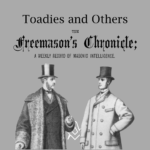 In the realm of Masonry, the principles of equality and respect are paramount. Yet, the presence of toadies—those who obsequiously seek favour from the influential—threatens these ideals. While Masonry embraces diverse beliefs and backgrounds, it rejects the sycophantic behaviours of toadies, flunkeys, and tuft-hunters, urging members to uphold genuine respect and self-worth. The Freemason's Chronicle - 22nd January 1876 |
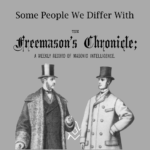 Unveiling the Unpleasant: Some People We Differ With Discover the intriguing dynamics of quarrels within the Masonic brotherhood. From the cantankerous to the litigious, the peevish to the vengeful, delve into the characters that challenge fraternal harmony. Explore their motives, temperaments, and the art of navigating disputes with these fascinating brethren. Brace yourself for a riveting journey into the world of conflicting personalities. |
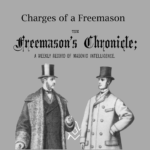 Unravelling the Masonic Mystique: A Deep Dive into the Freemasons' Charges - Explore the intricate world of Freemasonry, its principles, rituals, and the mechanisms for resolving internal disputes. Discover how this ancient fraternity fosters unity, promotes moral conduct, and upholds the sanctity of its secrets, while navigating the complexities of modern society. - The Freemason's Chronicle - 4 December 1875 |
 Unlock the hidden lessons of Masonic Studies! Don't settle for superficial knowledge or mere rituals. Discover the true depth and meaning behind Freemasonry. Expand your understanding of Tracing-Boards, Lectures, and more. Join regular Lodges of Instruction to enhance your Masonic journey. Become a knowledgeable Freemason, not just a token-bearer. Unleash the power of true Masonic wisdom today! |
 Uncover the incredible story of how Masonry saved the life of a Crimean War foot soldier in this historical and masonic account. Through the first hand experience of a soldier engaged in fierce hand-to-hand combat, witness the fateful encounter with a Russian Freemason that changed the course of his life. Learn how brotherhood and a deep dedication to the craft can lead to unforeseen and life-saving circumstances on the battlefield. |
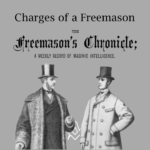 The Freemason's Chronicle - Charges of a Freemason The secrets of Masonry are the exclusive property of the Craft, and can never be communicated to one who is a mere labourer and not an accepted Mason. Hence, no labourer, that is, one who has not been regularly initiated in a legal Lodge. Article first published in The Freemason's Chronicle, 27 November 1875 |
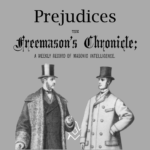 The Freemason's Chronicle - Prejudices Prejudices are partial judgments in favour of, or against certain persons or things, and, for convenience sake, may be ranged in two categories—those which are, comparatively speaking, harmless, and those which are harmful. Article first published in The Freemason's Chronicle, Oct. 2 1875. |
 The Freemason's Chronicle - Cliques Is Freemasonry - a Clique ? Man has been defined as a gregarious animal, but in his highly civilised condition he is gregarious only to a limited extent. First published in The Freemason's Chronicle, Oct. 2 1875, addresses the same challenges then as now. |
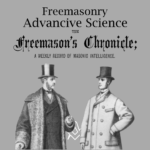 The Freemason's Chronicle - Freemasonry - an Advancive Science Is Freemasonry - an Advancive Science ? Not to confuse advancement with innovation. Has it been the case that Freemasonry's survival for 300 years plus is due to being an Advancive Science, tending to advance. First published in The Freemason's Chronicle 18 September 1875, addresses the same challenges then as now. |
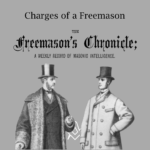 The Freemason's Chronicle - Charges Of A Freemason An interpretation of the "Charges of a Freemason", written Bro. Cornelius Moore and published in 1875, that introduce certain opinions that for some readers, will not sit well in contemporary times. - The Freemason's Chronicle, Sept. 11, 1875 |
 On The Order Of The Temple And Its Doctrine. THE Order of the Temple is divided into two great classes, denominated respectively the Order of the Temple and the Eastern Order. The Eastern Order gave birth to the Order of the Temple, and in the course of time has become an appendage of the latter. It is in ancient Egypt that we find the cradle of the Eastern Order. The Freemason's Chronicle, Sept. 4, 1875 |
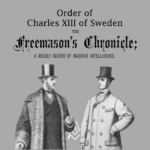 Order of Charles XIII of Sweden The following translation of the Manifesto of King JL Charles XIII of Sweden, on the occasion of his establishing the Masonic Order which bears his name, and of the Statutes of the said Order, may be interesting to our readers. The Freemason's Chronicle, Aug. 28, 1875 |
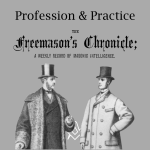 Most of our readers in the course of their experience, have doubtless met with enthusiastic brethren who take it for granted that a Mason can do no wrong. These enthusiasts are thoroughly convinced that the vast majority of those who join the Order are the most benevolent, the most moral, and the very noblest members of society. - The Freemason's Chronicle 10 July 1875 |
 An article investigating the relationship between masonry and citizenship. Are the principles of Freemasonry aligned with the freemason's claim to be a better citizen of the world? The Freemason's Chronicle - 19 June 1875 |
 A visitor must make clear his identity to the satisfaction of the Lodge he proposes to visit. More than once have we been asked to explain our views as to the reception of strangers in a Lodge. - The Freemason's Chronicle - 29 May 1875 |
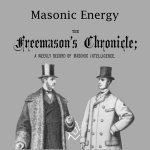 Is there reason in the accusation that Masonic energy looks only to a course of good feeds, when we can point to such grand results as have been achieved in these latter years, both in respect of the extension of our Order ? - 1May 1875 |
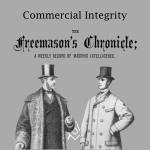 Implementing Freemasonry's peculiar system of morality in our day to day business affairs was the topic of this article, Commercial Integrity, first published in The Freemason's Chronicle - 8 May 1875 |
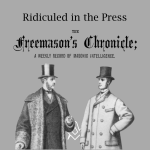 Ridicule has been somewhat illogically described as the test of truth. If it were so, Freemasonry ought to have perished long since. Two press reports from May 1875 covering the |
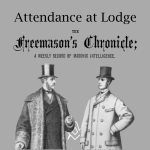 There are many things which Freemasonry will do for a man in the way of opening his mind and giving him larger and kindlier views of life, but Freemasonry itself, cannot eradicate the natural bias of the disposition. |
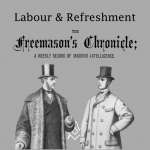 There is, we fear, too marked a tendency in very many Lodges to hasten through its labours, with a view to entering, as soon as possible, upon the business of refreshment. - The Freemason's Chronicle 17th April, 1875 |
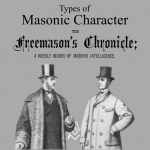 Another example that demonstrates that nothing really changes in Freemasonry. In an article the Types of Masonic Character published 145 years ago in The Freemason's Chronicle 10th April, 1875 |
 A brief history on the relationship between the British Monarchy and the craft - The Freemason's Chronicle 20th March , 1875 |
 What are the qualities of a convivial man and how does this dovetail perfectly in to Freemasonry ? 16th March, 1875 |
 A review of the "Sketch for the History of the Dionysian Artificers," a fragment, by Hyppoli to Joseph Da Costa - This little work may be regarded as, so to speak, the Holy Grail of Masonry. |
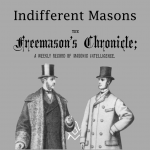 Nothing really changes, an article Indifferent Masons, From Le Monde Maçonnique 1874. Translation published in The Freemason's Chronicle 20th February, 1875 |
 In handling an intruder in the lodge, we endeavoured to show that a good Mason should be a gentleman, and a sincere man. The Freemason's Chronicle 20th February, 1875 |
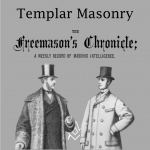 Templar Masonry - a historical aspect of the Religious and Military Order of the Temple published in The Freemason's Chronicle 13th February, 1875 |
 Secrecy perhaps the strongest objection urged by the enemies of the Masonic Order against its existence published in The Freemason's Chronicle 20th March 1875 |
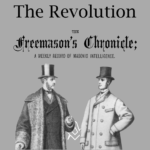 Freemasonry In The United States during And After The Revolution We take a look at Freemasonry in the United States during and after the Revolution first published in The Freemason's Chronicle - February 6, 1875 |
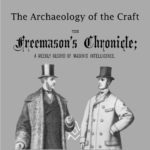 We take a look at the archaeological connection with the Craft, first published in The Freemason's Chronicle - January 30, 1875 |
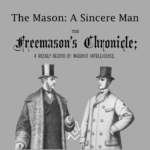 What it means to a Freemason to be a sincere man. Extract: first published in The Freemason's Chronicle - January 23, 1875 |
 What it means to a Freemason to be a citizen of the world ? First published in The Freemason's Chronicle - January 16, 1875 |
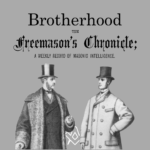 Brotherhood! In that one word what sympathetic associations arise. First published in The Freemason's Chronicle - January 9, 1875 |
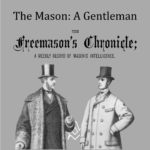 This opening article was written 145 years ago, yet it resonates with Freemasons today as it did then. First published in The Freemason's Chronicle, January 2, 1875, Issue 1 |
masonic knowledge
to be a better citizen of the world
share the square with two brothers

click image to open email app on mobile device


